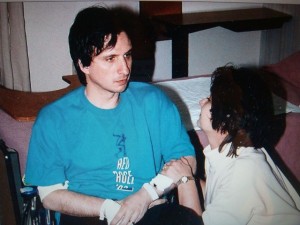
Lorie Sheffer returns for more of her midlife wisdom. Take it away Lorie:
When people meet my husband, they think he is polite, friendly and rather quiet. While he is all of those things, he is also the single most driven person I have ever known. Never one to announce his dreams or his goals, he just goes about quietly and methodically checking them off of his “to do” list. In the 1960s, he was one of millions of teenagers who were struck with Beatle mania. He wanted to learn to play electric bass guitar, but his father saw music lessons as a waste of money. Gary found a cheap bass and taught himself to play by ear. He got so good that he was able to supplement this income through high school and college, and even into his adult years, by playing in local bands. In high school, he played football and his team became county champions. When he decided he wanted to become an engineer, he was told by guidance counselors that his math skills were too weak, and to consider another career. Five years later he graduated from Penn State with a degree in mechanical engineering. He skied for the first time at age 21, and by the time he was 26 he was a member of the National Ski Patrol. It seemed that nothing was out of his reach if he set his mind to it. And then, at the age of 44, the unimaginable happened. Everything was taken away in a matter of minutes.
February 11, 1996 was a glorious winter day in York County, Pennsylvania. Gary had recently mastered snowboarding, and was taking a few runs while his 11-year-old son was practicing with the ski-racing club on another ski slope. While boarding on a steep but otherwise unremarkable slope, Gary fell. For him, this was unusual but not cause for alarm. What did interest him, however, was his seeming inability to hold his right glove in his hand when he removed it. He boarded to the bottom of the slope and rode the lift back to the top, only to find that it was now difficult to push his boot into his binding. Clearly something was wrong, so he headed to the ski patrol building, where it soon became obvious to his fellow patrollers that something very serious was happening. That something turned out to be a massive hemorrhagic stroke, caused by a congenital arteriovenous malformation, or AVM. Over the course of the next few hours, Gary lost all sensation in the entire right half of his body, lost the ability to speak and understand language, was partially blind in his right eye, and suffered from complete right side paralysis. I was in the shock trauma unit of the hospital when I was told by his neurosurgeon that he was “probably going to live” but would be left with “significant, permanent disability”. My first reaction? “You don’t know my husband. He won’t finish this ski season, obviously, but I’ll dust off my skis and have him back on the slopes when they open next season.” Ignorance is bliss, and I had no idea what we were in for. Had I known then what I know now about traumatic brain injury, I would have fallen apart for sure. I had no idea at that time that his chances of ever even walking again were about 10% at best. After a week in the intensive care unit, Gary was moved to a rehabilitation facility. He was one of the worst cases they had ever seen for a person his age. When I was asked by a group of his therapists about his interests and goals, one of them laughed and said, “Doesn’t this man ever do anything easy?” At that point, they knew they were working with a fighter. They considered it “game on!”
This story is one that can’t be told in one single blog. Patience is something I never had. Patience is something that every survivor of traumatic brain injury has to learn. Patience is what it will take for you to find out how this story ends, or if it has indeed ended. I promise I will let you know what happened, and how it happened. Have patience.